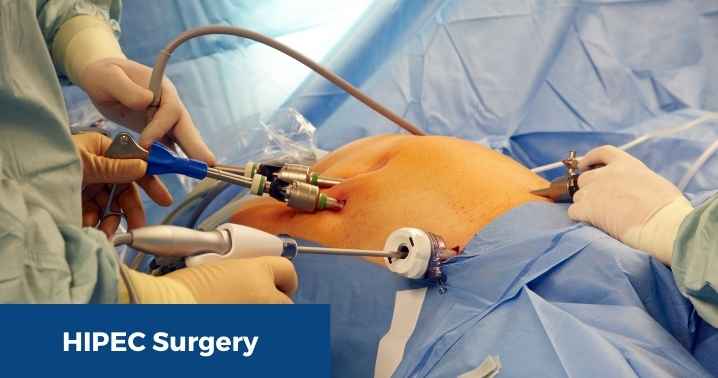- Home
- HIPEC Surgery
HIPEC Surgery

Hyperthermic intraperitoneal chemotherapy (HIPEC) is a type of cancer treatment that delivers heated chemotherapy drugs directly to the lining of the abdomen.
HIPEC is a two-step procedure where first cancer is surgically removed, and then chemotherapy drugs are given at high temperature to kill the remaining cancer cells.
Let’s learn more about the HIPEC procedure, its benefits and risk factors.
What cancers can be treated with HIPEC?
It is an advanced cancer treatment that treats cancer like:
- Colorectal cancer
- Gastric cancer
- Ovarian cancer
- Pseudomyxoma peritonei
- Mesothelioma
And several other rarer varieties of cancer, that spread to the peritoneal layer of abdomen.
HIPEC Surgery Procedure
HIPEC surgery is a two-stage process. Initially, your surgeon will perform a cytoreductive surgery. This is a major surgical procedure where all the visible tumor nodules are removed.In the second stage, heated chemotherapy drugs are delivered to the abdomen to kill microscopic tumour deposits that are invisible.
This can be done in one of two ways:
1) The surgeon may inject the heated chemotherapy drugs directly through the large incision that is used to perform the surgery ( open method).
2) The surgeon may insert a catheter (a thin tube) into the abdomen and pass the heated chemotherapy drugs through it.
After the HIPEC treatment is over, chemotherapy drugs are evacuated and the surgeon will close the incisions.
What should I expect after HIPEC surgery?
Most patients will stay in the hospital for 12-14 days after surgery. During this time, your recovery will be monitored closely for any signs of complications. You will also need to follow a special diet and may need to take antibiotics or other medications.
Your surgeon will give you more specific instructions about what to expect after surgery. They can also answer questions you may have. If you consider HIPEC surgery in Ahmedabad, talk with Best HIPEC Surgeon, Dr. Ridham Shah about the benefits and risks involved. They can help you decide if this is the right treatment for you.
Recovery Time after HIPEC surgery

Recovery from HIPEC surgery usually takes about four to six weeks. You will probably experience some side effects from the surgery and the chemotherapy drugs during this time. These side effects can include fatigue, nausea, vomiting, diarrhea, and abdominal pain. Your surgeon will give you specific instructions on caring for yourself during your recovery.
Benefits of HIPEC
HIPEC can be effective treatment for certain types of cancer that spread to the peritoneum commonly. However, several factors need to be considered before opting HIPEC surgery for a patient. This includes the patient’s overall health, disease burden, type of tumor, response to chemotherapy erc.
HIPEC surgery has improved survival rates in pseudomyxoma, mesothelioma, ovarian cancers and gastric cancers.
It involves delivering heated chemotherapy directly to the abdominal cavity during surgery, which helps to target any remaining cancer cells and minimize the risk of recurrence.
Complications related to HIPEC surgery
HIPEC may reduce the healing capacity of tissues. This may lead to complications. Most common complications associated with HIPEC are respiratory complications, incomplete healing of bowel anastomosis and infections.
To reduce these complications it is advisable to consider only experienced surgeons and high volume centers for HIPEC.
Success Rate of HIPEC Surgery
However, the long-term success of this surgery depends on many factors, such as the stage and type of cancer, the patient’s age and overall health, and whether cancer has spread to other parts of the body.
The best results are seen in PMP (pseudomyxoma peritonei). Patients undergoing cytoreductive surgery and HIPEC for PMP have shown more than 10 years of survival as compared to just 3 years with other methods of treatment.
Similarly, mesothelioma treated with chemotherapy alone leads to an average survival of 12 months.
HIPEC surgery improves this survival 4 times i.e. 50 months. Patients receiving cytoreductive surgery and HIPEC for ovarian cancers have a median survival of 45 months which is significantly higher as compared to those receiving only chemotherapy.
Trust in Expertise: Put your trust in the experienced hands of HIPEC Surgery Specialist in Ahmedabad Dr. Ridham Shah, a renowned HIPEC Surgeon in Ahmedabad who has successfully performed numerous HIPEC surgeries with exceptional outcomes.
Conclusion
HIPEC is an advanced cancer treatment for cancers that have spread to the peritoneum. A variety of cancers that affects the peritoneum can be treated with HIPEC. Careful patient selection, surgeon experience and skills give promising results after HIPEC.
To understand if you are the right candidate, you need to talk to your oncologist.
You can also book an appointment with our experts to know more about HIPEC surgery in detail.

Why Dr. Ridham Shah
A Surgical Oncologist Practicing In The City Of Ahmedabad
- Experience of a decade in treating cancer
- Expertise in Laparoscopic cancer surgery, Robotic cancer surgery
- Expertise in Digestive System Cancers, Colorectal cancers , Peritoneal cancers, advanced abdominal cancers
- Expertise in Cytoreductive Surgery, HIPEC, PIPAC
- Excellent support staff to help you during treatment
- 360 degree care
Specialities

Ovary Cancer

Rectal Cancer

Colon Cancer

Endometrial Cancer

Liver Cancer

Esophageal Cancer

HIPEC Surgery

Robotic Surgery

Vulvar Cancer

Gallbladder Cancer

Stomach Cancer

Pancreatic Cancer

Cervix Cancer
